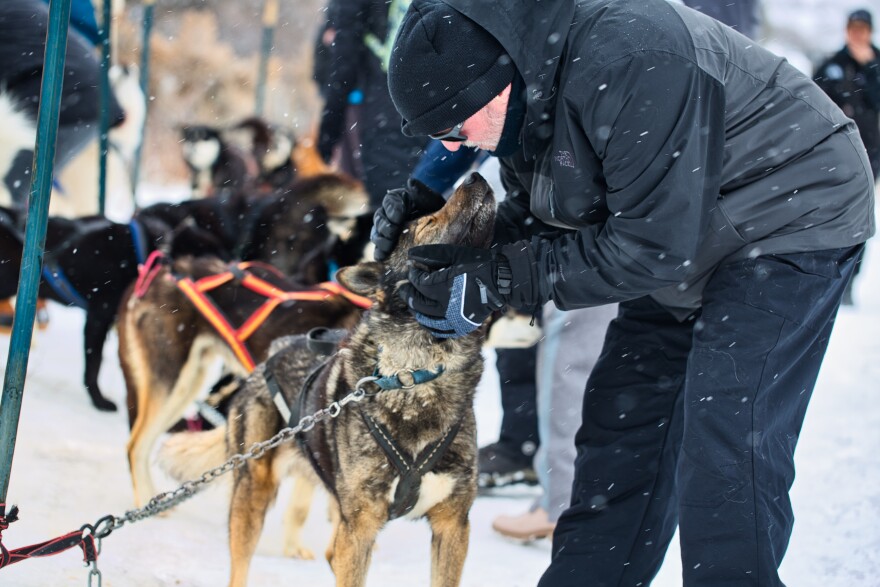The excited barks and whines of more than a dozen sled dogs get louder as Fernando Ramirez and his team of mushers prepare their sleds on a snowy afternoon in the Utah mountains.
The mushers attach the animals to their sleds one at a time. One dog, a chocolate-colored Alaskan husky with cloudy eyes named Humberto, has been on two runs already today, but he still pulls forward on the sled line, anxious for his musher to give the signal to go. And once the cue comes, the husky and his teammates push their paws against the icy ground and they’re off.
Fernando, 34, fell in love with dog sledding when he was just 8 years old after watching the 1995 movie “Balto.” It’s based on a true story of a dog who leads a sled team carrying live-saving medicine to sick children in an Alaskan village. Fernando became so enamored with dog sledding that he couldn’t wait to literally “run” with the idea.
“I had a yellow lab at the time that was sort of my first sled dog,” Fernando said. “We tried every avenue to get him to pull and see if he wanted to pull ... and he did.”
Fernando’s parents found him a sled at a garage sale, but his mom, who grew up poor in Zacatecas, Mexico, had one condition. He could only build his sled team from rescue dogs.

“I think maybe coming from that sort of background she said, ‘Every living being needs a chance,’” Fernando said.
Fernando feels his mom wanted to teach him this lesson through his dogs — and 26 years later, Fernando still honors his mom’s wishes.
He combined his two passions — rescuing dogs and dog sledding — and opened Rancho Luna Lobos, which translates to ranch of the moon wolves, 10 years ago. It’s located in Peoa, Utah, east of Park City. Fernando and his wife Dana take in unwanted dogs and house them at their 55-acre property.

They fund their operation by offering services like sled rides and a junior musher program for kids interested in the sport. But Fernando stresses that they want the animals to be dogs first, sled dogs second.
“This whole ranch is their playground,” Fernando said, gesturing to the paw prints stamped into the snow all around the property. “They run loose, they run free.”
The Ramirezes say they’ve rescued between 100 to 120 dogs since they opened. When they take in a new dog, they do whatever rehabilitation and behavioral training it needs before they make it available for adoption. They also introduce them to dog sledding. The ones that show aptitude for it get the full training and become part of the sled teams. Those dogs get to stay at the ranch indefinitely.

But not all dogs are cut out to be sled dogs, Fernando said. He can tell some who will be naturals right away just by looking at them, but some dogs like Humberto surprise him.
Humberto, or Humber for short, came to the ranch three years ago when he was just one. Dana explained to clients waiting for their tour that Humber’s previous owners said he was worthless and a waste of time. What they didn’t realize though was that Humber was born blind in both eyes. Back then, Humber didn’t have the clouds over his corneas that make his visual impairment evident today. But Dana said Humber doesn’t let this slow him down.

“We found that if we hooked [Humber] on collar to collar with another dog — she would act as his seeing eye buddy,” Dana told the clients. “Well, he got so good at that that we were able to hook him on to the team ... He’ll put himself right in the middle and he’ll feel how far he needs to go left or right.”

Showing visitors how the dogs live and work is also important for the future of dog sledding. Fernando says there’s a misconception that dogs are abused in the sledding world. The father of five said he wants to show the public that’s not the case.
“Running on the sled is something fun we get to do to express the dog's fitness, but the core of our sport is a relationship between the musher and the dogs,” he said. “My children have been racing since they were four years old, and they know this principle very, very well.”
The Ramirez family is also motivated by the transformation that dogs like Humber experience during their time at the ranch and the obstacles they are able to overcome.
“Humberto is blind and he still loves life 100%,” he said. “He’s just an amazing, amazing dog.”
Humber is currently training with Fernando Ramirez to be a lead sled dog.



